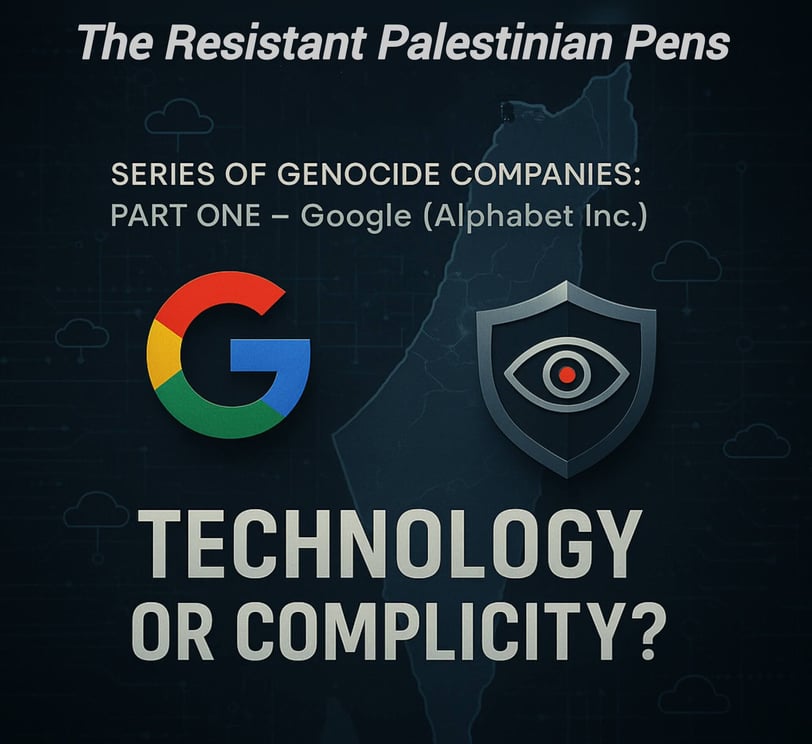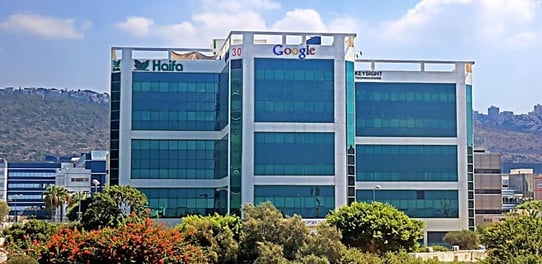Series of Genocide Companies: Part One – Google (Alphabet Inc.)
Explore Google’s controversial collaboration with Israel, including Project Nimbus and AI technologies, and its implications for human rights. This investigative report examines Google’s ties with Unit 8200, economic contributions, and ethical concerns
REPORT
Refaat Ibrahim
7/4/202510 min read


As international reports continue to document the crimes being committed against Palestinians in Gaza, mounting evidence reveals the dangerous role played by major global tech companies, chief among them Google, in facilitating and strengthening the digital and military infrastructure of the Israeli occupation.
What was once limited to occasional deals or cloud services has evolved into a systematic investment strategy, involving multi-billion-dollar acquisitions of Israeli companies and direct collaboration with the Israeli military on projects aimed at expanding the occupation’s surveillance systems and boosting its military capabilities.
In May 2025, a report published by Mondoweiss shed light on the largest acquisition in Google’s history: the company’s purchase of the Israeli software firm Wiz for $23 billion. This deal marks a new milestone in the deepening relationship between Google and Israel’s security and economic apparatus.
It coincided with international reports, most notably a June 2024 United Nations report, which listed dozens of global companies as complicit in enabling the occupation to carry out its repressive policies, including war crimes and forced displacement.
Francesca Albanese stated clearly that some of these companies are “profiting from the blood of Palestinians,” contributing, whether directly or indirectly, to the ongoing genocide by providing technological tools, supporting military infrastructure, or reinforcing the occupation’s economy.
This investigation seeks to trace the evolution of Google’s relationship with Israel, from the early days of collaboration, through the controversial Project Nimbus, to the major expansion of investments and on-the-ground presence in the occupied territories, in order to reveal how one of the world’s largest technology companies transformed from a search engine into a facilitator of aggression.
This in-depth report explores the nature of the relationship between Google and the Israeli occupation, including Google’s support for Israeli forces, its role in bolstering the occupation’s economy, and its collaboration with Israeli intelligence and military units.
Introduction: Google’s Presence in Israel and Its Ethical Complexities
Google, a global technology leader, has established a significant physical and technological presence in Israel through research and development centers, strategic investments, and major acquisitions. However, its close collaboration with the Israeli government and military, particularly through Project Nimbus and the provision of advanced artificial intelligence technologies, raises profound questions about its commitment to ethical standards and human rights.
This investigation sheds light on Google’s role in Israel, focusing on its ties with the Unit 8200 intelligence agency, statements from Israeli officials, and the economic and geopolitical impacts, drawing on internal documents and investigative reports from The Washington Post and Time.
1. Physical Presence and Workforce
Research and Development Centers
Google has established a substantial presence in Israel, with key offices at Matam 30 Center in Haifa and Electra Tower at 98 Yigal Alon Street in Tel Aviv-Yafo. These locations serve as central hubs for research and development, focusing on artificial intelligence, cloud computing, and hardware development, such as Tensor Processing Units (TPUs) and Network Interface Cards (NICs). Google employs approximately 2,000 workers across these facilities, reflecting its commitment to leveraging Israel’s technological talent pool.
Data Centers
In October 2022, Google launched its first local cloud region in Israel as part of Project Nimbus, in partnership with Amazon Web Services (AWS). This cloud infrastructure provides advanced services to the Israeli government and military, enhancing their technological capabilities. However, these data centers have raised concerns about access to sensitive data and their use in surveillance operations, with reports indicating they provide the Israeli government with “unprecedented access” to population data.
2. Investments and Strategic Acquisitions
Google’s Acquisition of Wiz
In 2025, Alphabet, Google’s parent company, acquired the Israeli cybersecurity firm Wiz for $32 billion, marking Google’s largest acquisition to date. Founded by veterans of Israel’s Unit 8200 intelligence agency, Wiz is a leader in cloud security and is expected to bolster Google Cloud’s capabilities against competitors like AWS and Microsoft Azure.
Wiz retains significant operational independence, reflecting Google’s strategy to integrate Israeli innovations. The acquisition has sparked concerns among Google employees and human rights organizations due to its ties to Unit 8200, which is accused of mass surveillance and human rights violations against Palestinians.
Previous Acquisitions
Google’s prior acquisitions of Israeli companies include
Waze (2013): Acquired for approximately $1.1 billion, enhancing Google Maps.
Alooma (2019): Strengthened Google Cloud’s data migration capabilities.
Siemplify (2022): Acquired for $500 million to enhance cloud security through Security Orchestration, Automation, and Response (SOAR).
Support for the Tech Ecosystem
Google has launched initiatives to support startups in Israel and Palestine:
- Google AI Startup Fund: A $4 million fund to support 20 Israeli AI startups.
- Palestinian Business Fund: A $4 million fund to support 1,000 small businesses and 50 startups, expected to secure 4,500 jobs.


Google Haifa offices credit: Shutterstock
3. Collaboration with Unit 8200
Nature of Unit 8200
Unit 8200, part of the Israeli military’s Intelligence Corps, is Israel’s largest intelligence unit, comparable to the U.S. National Security Agency (NSA). It specializes in signals intelligence (SIGINT), decryption, cyber warfare, and surveillance.
Operating from the “Urim” base, one of the world’s largest eavesdropping facilities, it can monitor communications across the Middle East, Europe, Asia, and Africa, and track ships. It also maintains covert listening posts in Israeli embassies and spies on undersea cables and Palestinian territories.
Google’s Connection to Unit 8200
Google’s most significant link to Unit 8200 is its 2025 acquisition of Wiz, founded by Unit 8200 veterans. This deal strengthens Google’s ties to Israel’s defense technology sector, enhancing Google Cloud’s cybersecurity capabilities. However, it has drawn criticism from organizations like Amnesty International, which stated that the collaboration “further entrenches Google’s stake in AI-supported military technology” and enables mass surveillance against Palestinians.
4. Economic Impact
Contribution to GDP
Google Cloud’s region in Israel is projected to contribute $7.6 billion to the GDP between 2022 and 2030, creating 21,200 jobs by 2030. A 1% increase in cloud computing adoption could generate 13,700 new IT jobs by 2033, with a cumulative economic contribution of $105.91 billion (1.58% of GDP) in a moderate scenario or $142.8 billion (2.13%) in a strong scenario.
Multiplier Effect
Google’s acquisition of Wiz is expected to generate 15 billion shekels in tax revenue, with a multiplier effect as Wiz employees and founders reinvest in local startups, strengthening Israel’s tech ecosystem.
5. Collaboration with the Israeli Forces
Project Nimbus
Project Nimbus, a $1.2 billion contract signed in May 2021 with AWS, provides cloud computing and AI services to the Israeli government and military. Colonel Rachel Dembinsky, head of the Israeli military’s computing division, described the cloud technology as a “platform that is a weapon,” emphasizing its role as “a set of systems the Israeli military fights with to the end.” Following the October 7, 2023 attack, Google provided critical support when the military’s internal cloud was overwhelmed.
AI Tools
Vertex AI: Granted to the Israeli Ministry of Defense post-October 7, 2023, for data analysis and custom algorithm execution.
Gemini AI: The military requested access by November 2024 for text and audio processing, including developing an AI assistant for document and audio file analysis.
The Gospel (Habsora): An AI-based system for target identification using intercepted communications and satellite imagery. Reports suggest Google’s cloud “directly contributed to combat applications,” potentially enabling systems like The Gospel. Military officials have expressed concerns about over-reliance and the system’s accuracy, raising questions about accountability in lethal decision-making.
Consulting Services
On March 27, 2024, a contract revealed Google charged the Israeli Ministry of Defense over $1 million for consulting services to design cloud infrastructure, with a 15% discount under Nimbus. This was the first public confirmation of the ministry as a direct Google Cloud client.
Statements from Israeli Officials
- Colonel Rachel Dembinsky: Described cloud technologies provided by Google and others as a “weapon” critical to military operations, stating they form “the backbone” of the Israeli military’s capabilities.
- Cybersecurity Officials: Affirmed that Google’s acquisition of Wiz reinforces Israel’s position as a global cybersecurity hub, noting that “Unit 8200’s expertise is unparalleled” and that integrating Wiz’s technologies into Google Cloud “will elevate global cloud security standards.”
6. Ethical Controversy and Internal Opposition
Contradictions with Google’s Principles
Google’s military activities conflict with its stated AI principles, which pledge not to use technologies in harmful applications. The original 2014 DeepMind agreement against military use was sidelined after restructuring, allowing military contracts. Reports indicate this systematic erosion of ethical safeguards reflects a shift toward prioritizing commercial interests.
Employee Opposition
Google’s involvement in Nimbus and AI tool provision sparked internal protests, leading to the dismissal of dozens of employees. Internal documents reveal executives’ concerns that this collaboration could harm the company’s reputation and be perceived as complicity in human rights violations.
International Accusations
A report by UN Special Rapporteur Francesca Albanese identified Google as part of a “joint criminal enterprise” supporting an alleged “genocide” in Gaza, citing data centers providing “unprecedented access” to sensitive data. Amnesty International accused Google of “eroding” its ethical principles by enabling military operations.
Philanthropic Activities
Through its donation-matching program via Benevity, Google supports pro-Israel charities like Friends of the Israel Defense Forces (FIDF), which has raised $34.5 million since October 2023 for soldiers, and Hayovel, which funds activities in occupied territories. These practices have sparked controversy for blurring the line between philanthropy and military support.
8. Human Rights Implications
Privacy and Surveillance
Google’s cloud and AI systems rely on vast data collection, raising concerns about mass surveillance. Technologies like Vertex AI and Gemini AI, capable of facial analysis, image classification, and object tracking, may be used in surveillance operations against Palestinians.
Social Disparities
Google’s focus on technological efficiency may reduce human job opportunities, exacerbating economic disparities. Rising AI service costs also place additional financial burdens on consumers.
9. Conclusion and Outlook
Google’s presence in Israel highlights a tension between its significant economic contributions and controversial military collaborations. Investments like the Wiz acquisition and startup funds bolster Israel’s status as a global tech hub. However, its cooperation with the Israeli military, particularly through Nimbus and AI tools like Vertex AI and Gemini AI, raises ethical questions about complicity in human rights violations.
Statements from officials like Dembinsky, describing the cloud as a “weapon,” underscore the strategic importance of these technologies in military operations. Amid ongoing internal and external pressures, Google faces a challenge in balancing commercial interests with ethical responsibility, necessitating greater transparency and a regulatory framework to ensure responsible AI use in sensitive contexts.
Google’s Reported Collaboration with the Israeli Military
Project Nimbus
- Description: A $1.2 billion contract with the Israeli government and military for cloud computing and AI technologies, in partnership with AWS. Google launched its first local cloud region in Israel as part of this project.
- Timeline: Signed in May 2021; cloud region activated in October 2022. Critical cloud/AI support was reportedly provided in October 2023.
- Associated Controversy: The Israeli military described the cloud technology as a “platform considered a weapon.” A UN Special Rapporteur’s report stated Google is part of a “joint criminal enterprise” aiding an alleged “genocide.”
Vertex AI
- Description: Rapid access granted to Google’s advanced AI service for the Israeli Ministry of Defense.
- Timeline: Post-October 7, 2023.
- Associated Controversy: Lack of transparency regarding specific military use; raises ethical questions about tech companies’ roles in conflicts.
Gemini AI
- Description: The Israeli military requested Google’s Gemini AI technology for text and audio processing.
- Timeline: By November 2024.
- Associated Controversy: Ongoing efforts to expand AI technology provision; ethical concerns about misuse in military operations.
Employee Donation Matching
- Description: Google matches employee donations globally to pro-Israel organizations, including those supporting soldiers and Israeli settlements.
- Timeline: Ongoing (reported in December 2024).
- Associated Controversy: Funds organizations like Friends of the Israel Defense Forces (FIDF) and Hayovel, which support military units and activities in occupied Palestinian territories, blurring the line between philanthropy and direct support for a conflict party.


Google’s Major Acquisitions of Israeli Companies
Wiz
Year of Acquisition: 2025
Reported Value (USD): $32 billion
Strategic Impact: Google’s largest acquisition; enhances Google Cloud’s cybersecurity offerings; underscores the strength of Israeli technology.
Simplify
Year of Acquisition: 2022
Reported Value (USD): $500 million
Strategic Impact: Strengthened Google Cloud’s security operations, particularly in Security Orchestration, Automation, and Response (SOAR).
Waze
Year of Acquisition: 2013
Reported Value (USD): ~$1.1 billion
Strategic Impact: Integrated community-based traffic and navigation data into Google Maps; expanded mobile advertising opportunities.
Alooma
Year of Acquisition: 2019
Reported Value (USD): Undisclosed
Strategic Impact: Enhanced Google Cloud’s data migration capabilities.
Role in Facilitating Alleged Genocide in Gaza
Google’s collaboration with the Israeli government and military, particularly through Project Nimbus and the provision of advanced AI technologies, raises serious questions about its role in enabling military operations accused of constituting genocide in Gaza.
According to a report by UN Special Rapporteur Francesca Albanese, Google, alongside companies like Amazon and Microsoft, is part of a “joint criminal enterprise” contributing to alleged human rights violations against Palestinians. This analysis focuses on how Google’s technologies enable military operations resulting in significant civilian casualties in Gaza, emphasizing the ethical and geopolitical implications of this collaboration.
This collaboration conflicts with Google’s stated AI principles, which pledge not to use technologies in harmful applications. Internal documents reveal a discrepancy between public statements and actual practices, with Google executives expressing concerns that Project Nimbus could be perceived as complicity in human rights violations.
UN accusations that Google contributes to “genocide” highlight the severity of this involvement, as its technologies are used in a conflict that has resulted in thousands of civilian deaths. This underscores an urgent need for a regulatory framework to ensure transparency and accountability in the use of AI in military contexts, preventing the misuse of these technologies in human rights violations.
Google’s collaboration with the Israeli military, through Nimbus, AI tools, and data centers, enhances military capabilities accused of facilitating genocide in Gaza. The provision of technologies like The Gospel and Vertex AI has enabled rapid data analysis and targeting, but lack of accuracy and accountability has raised concerns about civilian casualties. Despite being driven by commercial interests, this collaboration contradicts Google’s ethical commitments, necessitating international scrutiny and reforms to ensure responsible AI use.
Sources
https://startup.google.com/programs/accelerator/ai-first/europe-israel/
https://accesspartnership.com/wp-content/uploads/2022/10/Google-Cloud-Region-Israel_ENG-rev3.pdf
https://cloud.google.com/blog/topics/startups/ai-first-accelerator-in-europe-and-israel
https://developers.google.com/maps/documentation/javascript/localization
https://www.reddit.com/r/Israel/comments/1l8kyur/what_do_you_see_on_google_maps/
https://www.reddit.com/r/MapPorn/comments/1i8frfh/google_earth_has_begun_updating_images_of_gaza/
https://support.google.com/assistant/thread/325669799/problem-with-hey-google?hl=en
https://searchengineland.com/israelis-want-tax-google-support-local-content-publishers-182657
https://tribune.com.pk/story/2382781/google-activates-israels-first-local-cloud-region
https://tribune.com.pk/story/2524231/google-secretly-supports-israels-defence-ministry-with-ai-tools
https://iclg.com/news/22398-google-acquires-israeli-cybersecurity-company-wiz
https://support.google.com/googleplay/android-developer/answer/9844778?hl=en
https://www.google.com/about/careers/applications/locations/tel-aviv-haifa
https://www.timesofisrael.com/google-is-said-to-start-laying-off-employees-in-israel-in-coming-days/
https://nocamels.com/2018/04/google-shopping-to-launch-in-israel/
https://incubatorlist.com/google-for-startups-accelerator-israel
https://support.google.com/wallet/answer/12059326?hl=en&co=GENIE.CountryCode%3DIL
Awareness
Documenting reality, amplifying Palestinian voices, raising awareness.
Contact Us:
resistant.p.pens@gmail.com
Follow our social media
